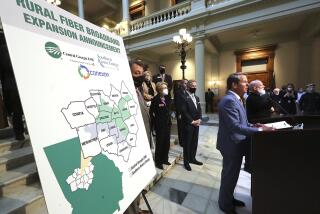Education Must Be Vital Route in Superhighway
- Share via
* The editorial, “Tricky Pit Stop on Information Highway,” (Jan. 23) on the need for the coming information superhighway to have public access is an important point that has not been strongly articulated up to now. But, in considering funding for the superhighway, attention needs to be paid to more than the hardware and access issues.
Funding of the communication infrastructure should not be seen as something totally separate from the information which will go over the highway. In the case of educational uses of the new technological delivery systems, it’s not enough to run the wires or other transmission systems into schools and colleges. Educational institutions do not have the funds required for production of high quality media-based educational programming, and there are currently few companies venturing into the production of educational products for the new delivery systems.
At Coastline Community College, we have been using educational television to deliver college credit courses to adult students, using both broadcast and cable television. The courses are complete instructional packages that include 26 half-hour television programs, textbooks, study guides and testing materials. To produce a course that meets technical and academic requirements and is effective at teaching “distance” students requires about two years of production time and costs anywhere from $1 (million) to $3 million. The courses can reach thousands of students, locally as well as at other colleges around the country.
Telecourses are effective instruction and are being seen, along with other media-based distance education, as a way of dealing with the increasing number of people needing higher education without requiring more campus construction, which the state can currently ill afford. Yet there is little state or federal monies for the production of telecourses.
It won’t do our schools and colleges much good to be linked into the new information superhighway if the only things on the highway are entertainment and shopping services. As a society, we have paid teachers to teach in classrooms. We need to consider ways to pay for the creation of the educational services and products for the new superhighway if we are to truly realize the potential of the infrastructure investment and solve some of our pressing social problems.
LESLIE PURDY
Administrative Dean,
Instructional Systems
Coastline Community College





